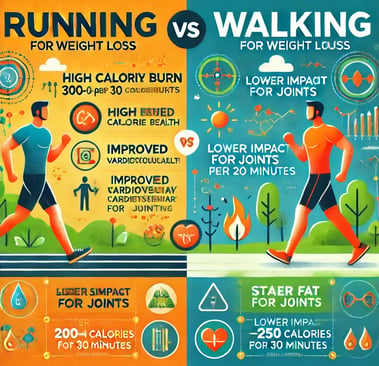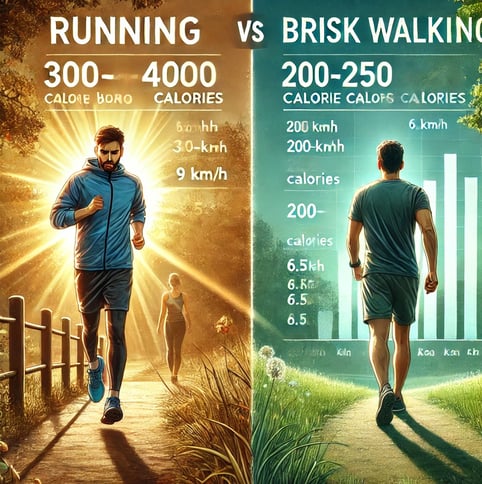Running or Walking: Which is the Best Choice for Weight Loss?
Running or walking: which is better for weight loss? Compare calorie burn, fat loss, and benefits for different profiles. Find the best fit for your goals!


If you want to lose weight and improve your health, you've probably wondered: which is better, running or walking? Both activities are popular, accessible, and offer various benefits for the body and mind. However, the ideal choice may vary depending on your fitness level, goals, and even physical restrictions.
In this article, we will compare the benefits of running and walking for weight loss, considering calorie burn, impact on metabolism, localized fat loss, and the best choice for different types of individuals.
Calorie Burn – Running vs. Walking
How Many Calories Are Burned in Each Exercise?
Calorie burn depends on factors such as body weight, exercise intensity, and duration. Here is an average of calories burned in 30 minutes of activity:
Light walking (5 km/h or 3 mph): 120 to 180 calories
Brisk walking (6.5 km/h or 4 mph): 200 to 250 calories
Moderate running (9 km/h or 5.5 mph): 300 to 400 calories
Intense running (12 km/h or 7.5 mph or more): 450 to 600 calories
Conclusion: Running burns more calories per minute than walking, but that does not mean walking is ineffective. If done regularly and at a brisk pace, it can lead to consistent weight loss.


Intensity and Impact on Metabolism
Running has an effect known as EPOC (Excess Post-exercise Oxygen Consumption), which makes the body continue to burn calories even after the workout. This happens because running requires more cardiovascular and muscular effort, increasing oxygen consumption after exercise.
Walking, on the other hand, does not generate the same metabolic impact but still contributes to fat loss when practiced regularly.
How Do Running and Walking Influence Fat Loss?
Running: Because it is a higher-intensity activity, it speeds up metabolism and promotes greater fat mobilization.
Walking: Can be effective in reducing fat if combined with a balanced diet and performed regularly at a fast pace.
Interval training: Alternating walking and running can enhance fat burning and prevent weight loss plateaus.


Benefits Beyond Weight Loss
Advantages of Walking
Lower impact on joints, ideal for beginners and overweight individuals.
Reduces stress and improves mental well-being.
Can be done for longer without causing excessive fatigue.
Easy to incorporate into daily routines (commuting, leisure walks, etc.).
Advantages of Running
Burns more calories in less time.
Quickly improves cardiovascular fitness.
Increases physical endurance and strengthens leg and core muscles.
Can help release more endorphins, boosting the feeling of well-being.
Localized Fat Loss: Myth or Reality?
Many people seek to reduce fat in specific areas of the body, such as the abdomen, thighs, and arms. However, localized fat loss is a myth. Fat burning occurs generally throughout the body, and both running and walking help in this


Which to Choose? It Depends on Your Profile!
For Beginners or Overweight Individuals
If you are just starting or are overweight, walking may be the best option, as it reduces the risk of injuries and helps establish a healthy habit.
For Those Seeking Fast Results
If your goal is to lose weight quickly and improve fitness, running may be the best choice. High-intensity interval training (HIIT) can also accelerate weight loss.
For Those with Joint Problems
If you experience knee pain or have a history of injuries, walking may be safer. Choosing soft surfaces like grass and sand can minimize impact.
Both running and walking are great options for weight loss and overall health improvement. The key is to choose the activity that best fits your lifestyle and fitness level. Walking is an excellent way to stay active with minimal impact, while running can yield faster fat-burning results.
Additionally, to maximize results, it's essential to combine exercise with a balanced diet and a good rest routine.
Regardless of your choice, the most important thing is to maintain consistency and adopt a healthy lifestyle!
And you, do you prefer running or walking?


